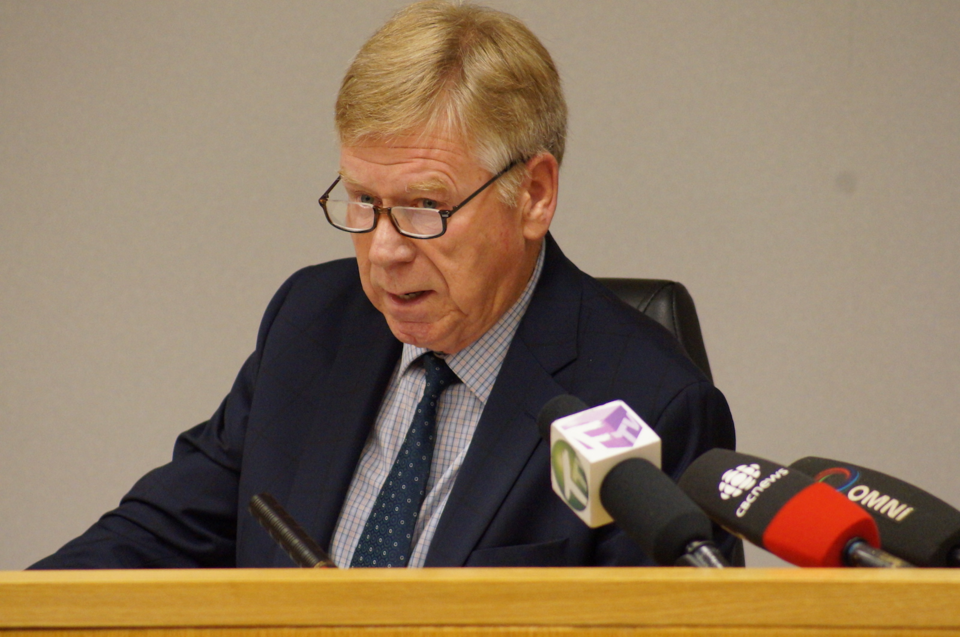Justice Austin Cullen addressed the public for the first time Friday in his role as commissioner for the Commission of Inquiry into Money Laundering in British Columbia.
Cullen presided shortly over a preliminary hearing to determine the standing status of four applicants, including on-leave B.C. Lottery Corporation CEO and president Jim Lightbody, who argued via his lawyer Robin McFee, Q.C. that he requires special standing to protect his personal interests, which may conflict with those of BCLC and BCLC employees (who are represented by the B.C. Government and Service Employees’ Union, which already has standing status).
Lightbody also cast shade on an independent money-laundering in gaming report (“Dirty Money”) to Attorney General David Eby by retired RCMP Assistant Commissioner Peter German.
“Mr. Lightbody takes significant issue with a number of observations” by German, McFee told Cullen.
Lightbody was BCLC vice-president of casinos and gaming from January 2011 until January 2014. Thereafter he became the Crown agency’s top boss. This is a period the inquiry is expected to focus on, as during this time “small time loan sharking had evolved into large-scale money laundering,” according to testimony from BCLC employees to German.
“Lightbody can provide personal and unique insight into government oversight of the casino operations,” said McFee.
As for the criticism of reports such as German’s, Cullen stated in his opening remarks: “The Commission has various statutory powers available to it, such as the power to compel witnesses and order disclosure — powers that were not available to the authors of the previous reports. It is expected that this will enable a more comprehensive review of the nature and scope of money laundering in the province and the conditions that have permitted it to expand and evolve.”
Standing status grants special or highly-knowledgeable individuals or groups procedural rights during the two-year inquiry. Cullen has yet to determine those rights but they may include: representation by counsel; proposing witnesses; applying to participate in evidentiary hearings; reviewing documents; and making submissions.
Also seeking standing status is Fred Pinnock, the RCMP Unit Commander of the Integrated Illegal Gaming Enforcement Team (IIGET) for British Columbia from September 2005 until his retirement in 2008. Rich Coleman, the minister responsible for gaming policy and enforcement, shut down IIGET a year later.
Pinnock’s lawyer Paul Jaffe said Pinnock wants standing status as he is highly involved in the matters before the commission — namely money laundering in real estate and government-sanctioned gaming and its enforcement or lack thereof.
Jaffe argued that unlike most of the other organizations granted standing order, Pinnock has no interests to protect. He is also one of the few “whistleblowers” on the matters. The public, he argued, would perceive it in its interest to have Pinnock in standing status with the commission.
“I don’t think one can overstate the importance of this commission being seen by the public that it has a level playing field where all the discrepant interests can be addressed,” said Jaffe.
Jaffe also said BCLC is failing to produce records under freedom of information laws. He said Pinnock, who believes his mandate was interfered with, is able to give substantial evidence.
Another whistleblower applicant is Ross Alderson, former director of anti-money laundering and investigations at BCLC. Alderson announced via his lawyer that he would not pursue standing status but rather provide testimony whenever called upon. Alderson claims, in media reports, that officials ignored his warnings and reports.
Brad Desmarais, BCLC’s vice-president of compliance and security and former vice-president of casino and community gaming, is also seeking standing status. His work was also criticized in German’s report and so, for similar reasons to Lightbody, he is seeking standing status. Lawyer David Butcher said the commission’s terms of reference are making individuals “concerned whether or not they are at jeopardy.”
Butcher asked Cullen for a one-month adjournment to provide documents that are subject to legal restrictions but which will provide reason to grant Desmarais standing status.
Cullen adjourned the hearing until a later date, yet to be determined.



